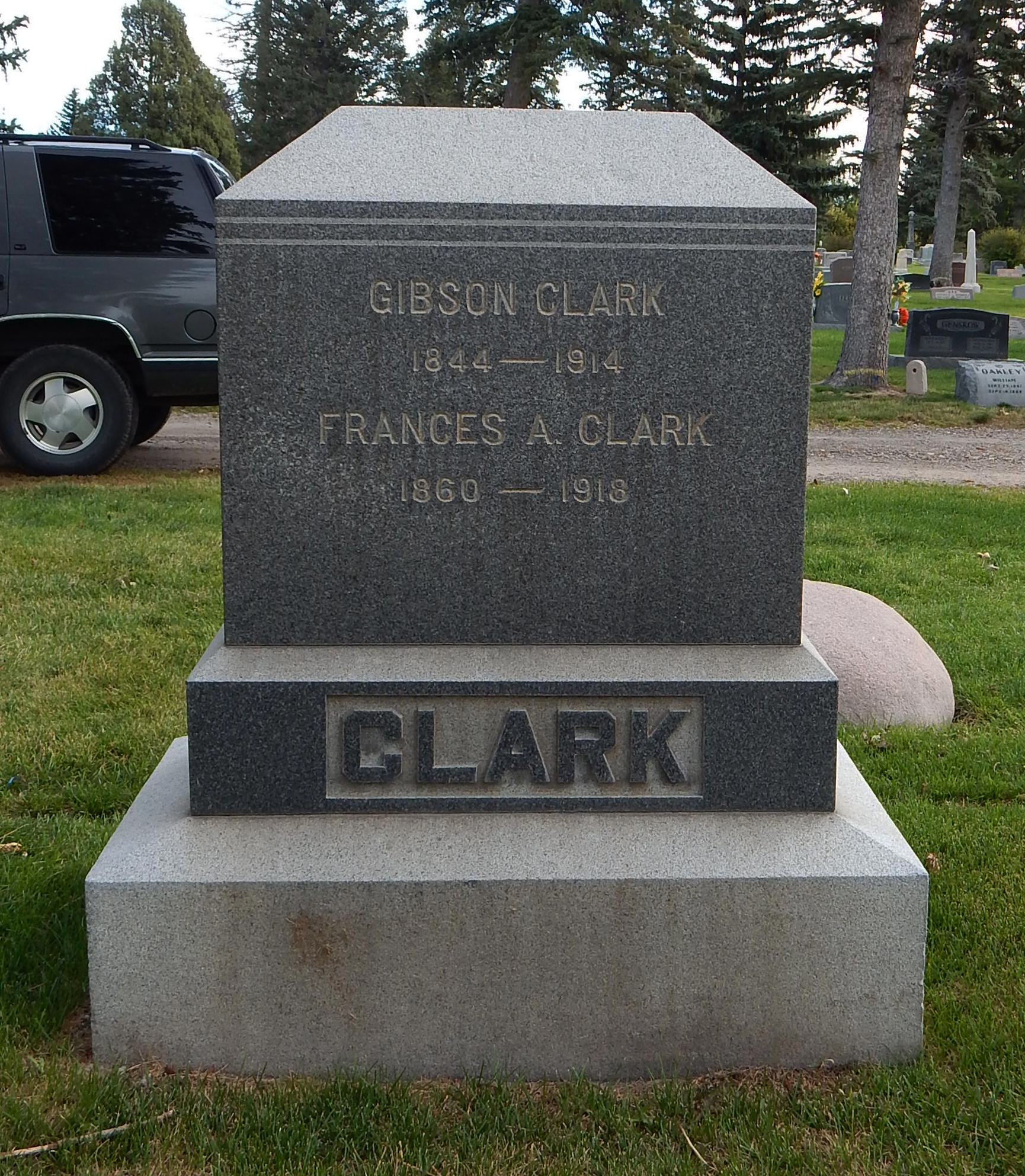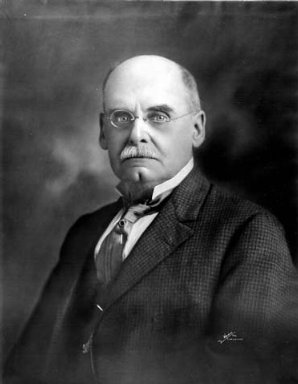When the news of the Judge's death became known this morning there were hundreds of expressions of sincere sorrow. The regret of his great number of friends here will be reflected throughout the state, in every part of which he has been well known for years.
From admission to the bar to associate justice of the supreme court in twelve years, was the phenomenal rise of Judge Clark in the legal profession. For nearly thirty years he has been one of the leading attorneys of Wyoming.
Gibson Clark was born in Clark county, Virginia, in 1844. He was educated in the common schools and at the beginning of the War of Rebellion enlisted in the Confederate army, serving with the Parker battery until the final surrender of Appomattox. He participated in some of the bloodiest engagements of the war, including Chickamauga, Spottsylvania, Cold Harbor, Gettysburg and Petersburg. At the close of the war he returned to Virginia but in 1866 moved to St. Louis, where he was employed as a clerk in a mercantile establishment. Later in the same year he went to Fort Laramie, then in the territory of Dakota, arriving there after driving a six mule team from Nebraska City. He was employed at Fort Laramie as a clerk until 1872, when he went to Nevada and Utah, where he engaged in mining for a year. He read law while living on his earnings as a clerk and in 1880 was admitted to the Utah bar, but did not begin practice until three years later, when he opened an office at Fort Collins, Colo. He remained there until 1886 and then moved to Cheyenne, quickly building up a lucrative practice here. In 1892 he was appointed as associate justice of the Wyoming supreme court, which office he resigned in 1894 to accept the post of United States attorney for Wyoming. At the expiration of his term in 1898 he resumed private practice here. In recent years he has been associated in practice with his son, John D. Clark, the firm of Clark & Clark being one of the best known in the state. Several years ago he suffered a paralytic stroke from which he never recovered. He was able, however, to continue the practice of his profession, the clarity of his remarkable intellect remaining unclouded.
In 1881 he was married to Miss Frances Johnson of Iowa, who, with four sons, survives him.
John D. Clark is one of Cheyenne's most able lawyers, having been engaged in the practice with his father for several years. Hopkins Clark is a civil engineer and lives in Los Angeles, California. Frank Clark resides in Cheyenne and is identified with the Federal Land company. Rober Clark is a student in the Cheyenne schools.
Judge Gibson Clark ranked as one of the strongest members of the Wyoming bar. He possessed a keen, analytical mind that went immediately to the basis of every proposition he investigated. His law practice covered a wide range and in later years he gave special attention to problems affecting irrigation. He was always a great reader and a deep student; his memory was remarkable, even during his years of illness.
As a citizen he had high ideals and sought to impress them upon the community. A veteran of the Confederate army, he became a most loyal and enthusiastic supporter of the united country. An address which he delivered at a G.A.R. meeting some years ago was considered one of the finest pieces of patriotic sentiment ever delivered in the state.
Judge Clark was a pioneer in the true sense and bound to himself with hook of steel old and young and retained all of the friends he ever made. He was a man of large sympathies and clear of vision. His most casual observation and discussion of public matters might easily have taken rank as a classic. His death is a loss to the entire state.
© Wyoming Tribune no. 298 December 15, 1914, page 1 & 2
When the news of the Judge's death became known this morning there were hundreds of expressions of sincere sorrow. The regret of his great number of friends here will be reflected throughout the state, in every part of which he has been well known for years.
From admission to the bar to associate justice of the supreme court in twelve years, was the phenomenal rise of Judge Clark in the legal profession. For nearly thirty years he has been one of the leading attorneys of Wyoming.
Gibson Clark was born in Clark county, Virginia, in 1844. He was educated in the common schools and at the beginning of the War of Rebellion enlisted in the Confederate army, serving with the Parker battery until the final surrender of Appomattox. He participated in some of the bloodiest engagements of the war, including Chickamauga, Spottsylvania, Cold Harbor, Gettysburg and Petersburg. At the close of the war he returned to Virginia but in 1866 moved to St. Louis, where he was employed as a clerk in a mercantile establishment. Later in the same year he went to Fort Laramie, then in the territory of Dakota, arriving there after driving a six mule team from Nebraska City. He was employed at Fort Laramie as a clerk until 1872, when he went to Nevada and Utah, where he engaged in mining for a year. He read law while living on his earnings as a clerk and in 1880 was admitted to the Utah bar, but did not begin practice until three years later, when he opened an office at Fort Collins, Colo. He remained there until 1886 and then moved to Cheyenne, quickly building up a lucrative practice here. In 1892 he was appointed as associate justice of the Wyoming supreme court, which office he resigned in 1894 to accept the post of United States attorney for Wyoming. At the expiration of his term in 1898 he resumed private practice here. In recent years he has been associated in practice with his son, John D. Clark, the firm of Clark & Clark being one of the best known in the state. Several years ago he suffered a paralytic stroke from which he never recovered. He was able, however, to continue the practice of his profession, the clarity of his remarkable intellect remaining unclouded.
In 1881 he was married to Miss Frances Johnson of Iowa, who, with four sons, survives him.
John D. Clark is one of Cheyenne's most able lawyers, having been engaged in the practice with his father for several years. Hopkins Clark is a civil engineer and lives in Los Angeles, California. Frank Clark resides in Cheyenne and is identified with the Federal Land company. Rober Clark is a student in the Cheyenne schools.
Judge Gibson Clark ranked as one of the strongest members of the Wyoming bar. He possessed a keen, analytical mind that went immediately to the basis of every proposition he investigated. His law practice covered a wide range and in later years he gave special attention to problems affecting irrigation. He was always a great reader and a deep student; his memory was remarkable, even during his years of illness.
As a citizen he had high ideals and sought to impress them upon the community. A veteran of the Confederate army, he became a most loyal and enthusiastic supporter of the united country. An address which he delivered at a G.A.R. meeting some years ago was considered one of the finest pieces of patriotic sentiment ever delivered in the state.
Judge Clark was a pioneer in the true sense and bound to himself with hook of steel old and young and retained all of the friends he ever made. He was a man of large sympathies and clear of vision. His most casual observation and discussion of public matters might easily have taken rank as a classic. His death is a loss to the entire state.
© Wyoming Tribune no. 298 December 15, 1914, page 1 & 2
Family Members
Sponsored by Ancestry
Advertisement
Advertisement












